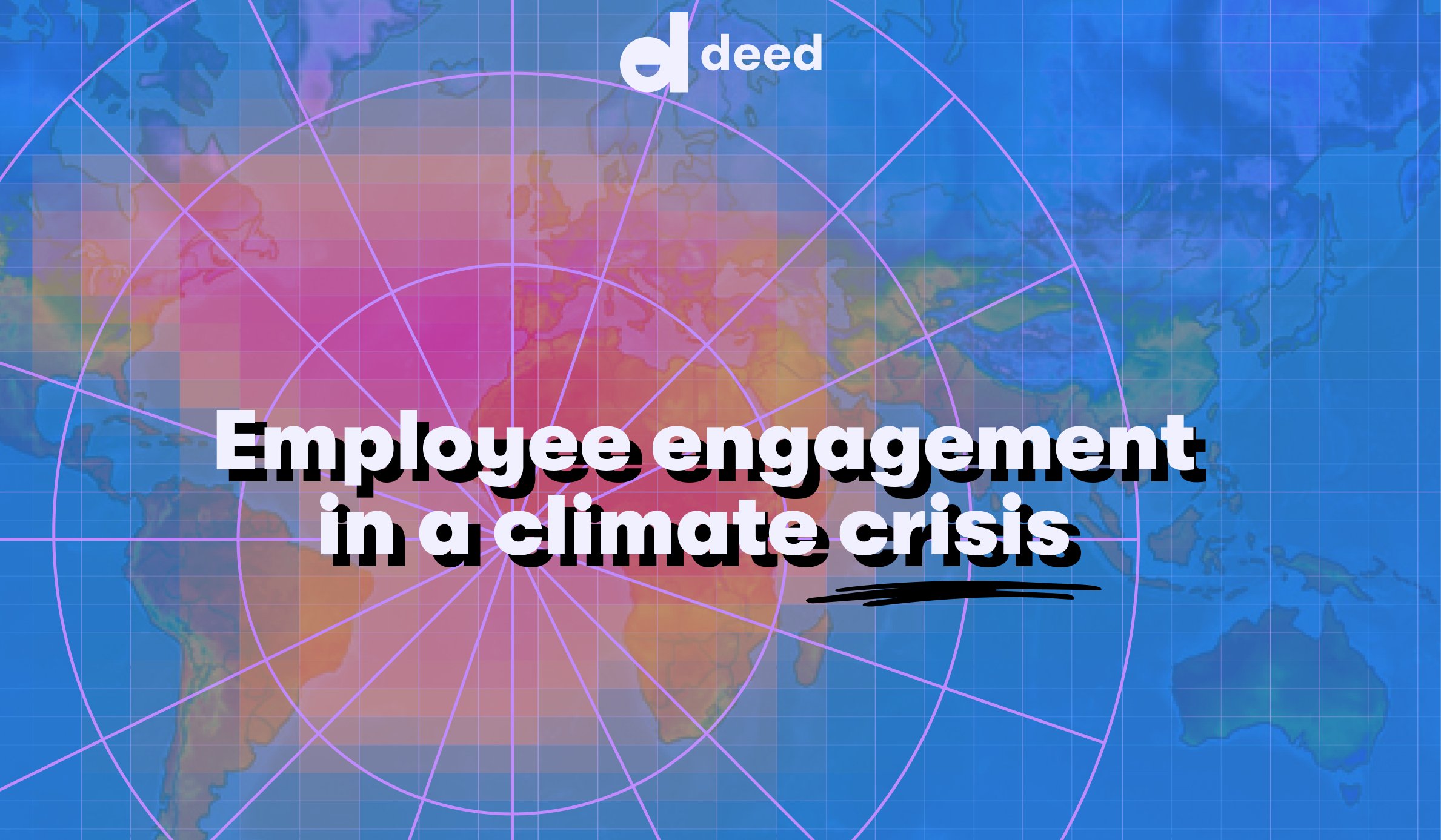Employee Engagement in a Climate Crisis
Here's how to beat extreme heat at work.
The intensity and regularity of extreme weather patterns present new challenges for social and environmental impact leaders. As climate scientists continue the hard work of convincing the public and those with power to take extreme weather seriously, we are tackling complex new challenges of our own.
This summer in the United States, record-breaking temperatures especially in the southwest are changing the way people live and work. For those with desk jobs, the heat means working from home as much as possible, otherwise going from air conditioned car to air conditioned office. Remember that last year, a major heatwave in Europe caused cooling system failures at Google and Oracle's data centers, temporarily taking some computers offline. But when we think about non-desk workers it's easier to see how dealing with extreme heat in one workplace has a chain reaction throughout entire communities. In Phoenix, Arizona, for example:
The city is investing in container storage housing, which can be built indoors in air-conditioned environments and then installed on site using a crane. So it is much less exposure for our construction workers, and we're hopeful that with making more of the process indoors, they will be safer and better off.
Extreme heat can impact our businesses in previously unimaginable ways. As we strive to respond to each problem induced by climate change as it arises, it is crucial to never lose sight of our employees. We must always look for new ways to ensure their health, wellness, and productivity needs are met.
Here are some action-ready tips for how to approach employee engagement in a climate crisis.
FOUR TIPS FOR EMPLOYEE ENGAGEMENT DURING THE CLIMATE CRISIS
1. KNOW THE FACTS, USE THE FACTS
You’re doing this already, but note that there’s a difference between staying on top of the news and incorporating the latest updates and scientific findings into a more responsible corporate leadership strategy.
In Germany, for example—where the heatwave is expected to extend next week—if temperatures exceed 26°C/79°F, “employers must ensure that workers proceed with their activity safely, including providing drinkable water when the thermometer reaches 30 degrees Celsius, and allowing for breaks,” according to Euronews.
Also, be sure to reach out to your networks and search LinkedIn for how your industry peers are shifting company policy, and enhancing the public conversation with their thought leadership.
2. GIVE YOUR EMPLOYEES ACCESS TO NONPROFITS ON THE GROUND
Your employees will not lose sight of the fact that extreme heat isn’t just an inconvenience in the workplace, but a serious crisis with deadly consequences. From rampant wildfires to dehydration, the effects of climate change impact everyone—especially those whose health may be compromised due to age, illness, or other health conditions.
The latest heatwave has already claimed 500+ lives in Spain, according to Prime Minister Pedro Sanchez. And in France, 37,000 people are now internally displaced, after the wildfires forced them to flee their homes, The New York Times reports, with doubtless more to follow there, as well as in Greece, Spain, and Portugal.
Help is on the way, thanks to incredible nonprofit organizations working on the ground. Through the International Federation of Red Cross and Red Crescent Societies (IFRC), which activates their globe-spanning network of national societies in times of crisis, the Red Cross is providing “shelter, food, & direct assistance to those in need.”
Deed is empowering corporate leaders to directly support the IFRC in its crucial humanitarian work in Europe and the world over. We connect you and your employees with volunteer and giving opportunities to support local organizations, like the American Red Cross for those of us in the U.S., today at a time of great need, and over the long-term.
3. EXPAND WORK-FROM-HOME AND VIRTUAL ENGAGEMENT OPPORTUNITIES
Whenever you hear directly or suspect implicitly that working from home would help your employees feel healthier, happier, and more productive, you should take the opportunity to let them do so. In extreme heat, it’s important to take care to ensure we are comfortable to work and conserve any energy it isn’t necessary to expend (like most commuting).
As we’ve learned over the past few years, there are many exciting ways to keep your employees engaged through virtual opportunities. You might even organize a fun virtual event in support of a favorite nonprofit.
One fun virtual event a Deed partner offered their employees was an executive lip sync challenge, in which executives competed for employee votes on best performance of a song of their choice, thematically connected to a nonprofit (e.g., “Take Me to the River” by Al Green would pair well with charity:water, especially during the heatwave when access to potable drinking water is crucial).
4. ENGAGE YOUR HUMAN RESOURCES/PEOPLE, SOCIAL IMPACT, AND ERG TEAMS
The climate crisis affects all of us in many different ways, and the only way to make sure that you’re meeting your employees where they’re at and keeping your team on the same page is by activating your human resources/people and social impact teams.
Your people team is there in part to foster open and honest dialogue between you and your team, even on the most sensitive areas of employees’ lives. Consider encouraging your people team to dedicate a segment of their outreach to specifically address how your team is experiencing extreme heat and other negative effects of climate change.
Whether you have a dedicated social impact team, or if your ESG programming lives in another department, it’s worth involving your impact leads in a conversation about how CSR can make a meaningful difference during this heatwave and in the long fight to curb climate change. We always recommend incorporating both evergreen and reactive programs to give your employees the freedom to choose what causes to support now and over the long term.
You may even have an employee resource group (ERG) dedicated to sustainability, climate change, or the local community, any of which would make that group a relevant stakeholder to involve in your discussions of how to respond to the current crisis.
CONCLUSION
Corporate leaders have a responsibility to take with all due seriousness the current heatwave coursing through Europe, and the many compounding effects of climate change worldwide. As fatalities and internal displacements continue to rise, there is no doubt that if we fail to leverage our time, influence, and resources for the good of the world, then we will be held responsible for not doing more to help the victims and prevent the next tragedy.
Right now, we can remember to not just know the facts, but to use what they tell us to inform our internal policies and guide public discussion. Hopefully, by expanding our employees’ access to nonprofits on the ground, we can alleviate some of the suffering, from France to Greece, and the word over. This is also a good time to reflect on how extreme heat may impede the health, wellness, and productivity of our employees, and to expand WFH and virtual engagement opportunities wherever and whenever possible. Thankfully we aren’t alone; our human resources/people, social impact, and ERG teams are there to help us meet the moment.
The rapidly evolving, increasingly complex problems of the modern world demand smarter, faster decision-making from the business community. Executives have a clear role to play here: to prove we can only do well in business in the long-term by doing good for the world, we must lead our employees, customers, peers, and community by example, through authentic ESG and CSR initiatives.
ONE MORE THING: HOW TO START RESPONSIBLY DRIVING EMPLOYEE ENGAGEMENT IN A CLIMATE CRISIS
At a time when 80 percent of CEOs expect investments in environmental sustainability to improve their business results within five years (per IBM), it’s not a question of why to bring your social impact program into the modern era—but how to get started.
We intentionally take a collaborative, nimble, and empathetic approach to respond to times of great need like the current heatwave in Europe and the compounding effects of climate change.
Deed is for change-makers who know modern problems demand modern solutions. We have created the most inclusive, insightful, and useful impact tool to artfully bring people together.
If you’re looking for new ways to responsibly engage your employees and make a difference on one of the world’s most pressing issues, please get in touch today.

